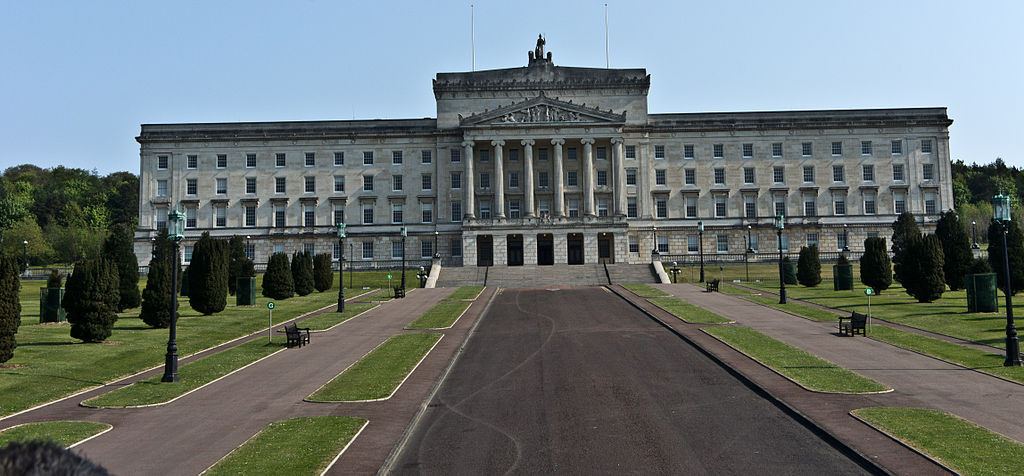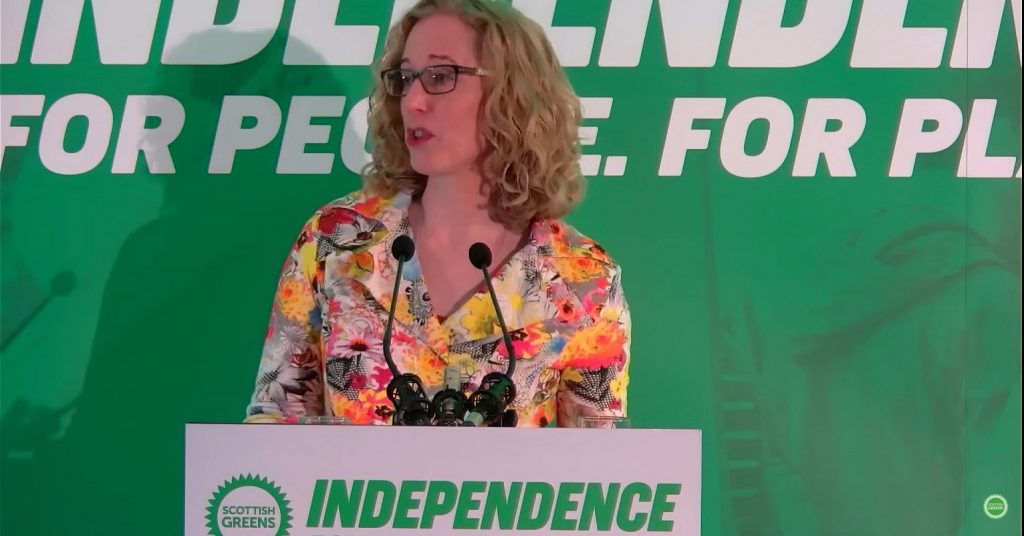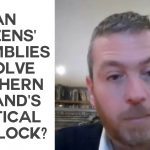Post-Brexit, Northern Ireland is being hung out to dry over the border

The Westminster inquiry into the future of the Irish border announced last week is useless if we still don’t know what kind of Brexit this government wants.
“Brexit means Brexit,” concluded Theresa May, back in July, in a not very ambitious bid to wipe away the enshrouding uncertainty of a post-referendum UK. What does it actually mean?
“It means leaving the European Union,” explained David Davis, Secretary of State for Exiting the European Union, apparently just getting to grips with his brief. Perhaps leading Leave campaigner, and First Minister of Northern Ireland, Arlene Foster, could offer a bit more depth on what Brexit really means for concerns like the border–
“Brexit means Brexit and our Prime Minister is very clear about that and I support her in that.” Right.
It is now three months since the referendum, and as far as the future of the 310 mile border between Northern Ireland and the Republic is concerned, we are clueless. The funny thing is though, we always were. It could just be me, but I don’t even remember the border ever being much of a burning issue in the run-up to June 23rd. How did that happen?
Leavers, of course, did their best to deflect the border question as a non-issue, just another scare story from an unscrupulous Remain camp. “What’s there is perfectly operational and would be sustainable,” said the NI Vote Leave campaign chairman, Lee Reynolds. Looking back through the campaign’s material online it barely receives a mention, except to falsely post that FactCheckNI “says NO border checks after we Vote Leave.” (The article clearly cites “increased border enforcement” as a possibility.) When pushed in an interview on how the UK might seek to meet the campaign’s promise of controlling immigration via an open border with the European Union, Reynolds feebly pointed to already existing spot checks. I’m assuming he means checks like the Gardaí’s half-assed dander up the Belfast-Dublin Airport bus, which I was on the receiving end of the other week. I didn’t have my passport though, as I wasn’t flying. The guard said that was grand.
Dodging questions like the border of course allowed the Leave campaign to persist with their stubbornly simple catch-all narrative, refusing to commit to any post-Brexit pathway, promoting a best-of-all-worlds utopia. Indeed, the campaign relied upon such tactile shapeshifting throughout – whether you were passionately against freedom of movement, or determined that the UK could liberate ourselves from political union while remaining in the single market, each with totally different implications for the Irish border (and therefore Northern Ireland), you would be welcomed with open arms by Boris and Gisela and Farage and Hannan. We don’t need clarity on what relationship we might be able to form with the EU, went the argument, because we are big enough and important enough to get whatever we want. Don’t you think we are big and important?
It’s hard to blame the Remain campaign for failing to answer a question like that. But in Northern Ireland especially, we must regret that Leave voices got away with dismissing the border question when its status is so delicately fundamental and the prospect of change so unavoidable. So complacent was the attitude of Remain voters, and so far-fetched the idea of a return to watchtowers and military checkpoints, that few seem to have concerned themselves with its reappearance. However as those who have actually delved through a haze of legal ambiguity can attest, it’s a different kind of border we should be worried about.
“When Arlene Foster and David Davis promise that there will be no return to a hard border they conjure images of the fortified outposts of the Troubles, which won’t be returning,” explains Colin Murray, a Senior Law Lecturer at Newcastle University who has studied the potential impacts of Brexit on Northern Ireland. “But outside of a conflict context a hard border simply means a border which impedes the movement of goods and people due to visa and customs requirements.”
That kind of hard border, concluded Murray and his colleagues in a study back in June, is indeed highly likely, largely because, despite what Davis claims, “there are no other ‘external’ EU borders that do not come with border controls.” While the Common Travel Area agreement between the UK and Ireland allows free movement of citizens and pre-dates their membership of the EU, systematic customs checks (and thus long waits at many crossing points) only ended in 1993 thanks to the Maastricht Treaty and the introduction of the single market.
EU officials have long been clear that single market membership must be sacrificed if Britain wishes to have any control over immigration, meaning customs checks, and queues, will return to the Irish border. But it could go further than that. With the UK outside the single market the Republic will pivot towards the EU for trade and have little reason to maintain its position outside of Schengen, the agreement that guarantees passport-free travel throughout most of mainland Europe. That would make entry from the EU into Ireland even easier, but entry from the UK into Ireland a hell of a lot more difficult.
And to those who think that the “special relationship” between London and Dublin can overcome such challenges: any divorce deal between the UK and the EU following Article 50’s triggering will need wide consensus, possible unanimity, from member states. If there is a suspicion that some citizens are being discriminated against (for example, those from Eastern European countries) in favour of others (say, the Irish), the deal will almost definitely go nowhere.
The border can no longer be dismissed as a technicality that we’ll get round to dealing with. Its current status forms a vital part of nascent (and fragile) Northern Irish identities. The ability to travel, live and work on both sides, with barely a second thought of nationhood, has been a key steadying factor in the tough balancing act of nationalists who live in the six counties but consider themselves Irish. The only genuinely viable alternative to some hardening of the Irish border floated by some (more often than not distant) observers, is that the EU’s external frontier actually shifts up and over to the Irish Sea, enveloping Northern Ireland, meaning customs (and possibly passport) checks for everyone entering and exiting mainland Britain. The remarkable thing about this suggestion is that it would have precisely the same destabilising effects on identity but on the ‘other side’ – unionists who would no doubt be horrified at the prospect of denigration to second class citizenship of the UK and a forced pivot towards the south for trade and travel.
What Theresa May and the government refuse to understand is that the desire for negotiation news is not about some running commentary on strategy. It’s about taking the responsibility for deciding what this vote means. Two years ago, the SNP and the Yes campaign were challenged religiously on how an independent Scotland would fund itself as a nation, how it would re-enter the EU, how it could keep the pound. No one in the Yes campaign could guarantee any of those commitments. But what made them legitimate was that through the reels of policy papers the campaign’s intentions were clear. It’s not about telling us what will happen (which no one can know). It’s about telling us what you want to happen (which, by now, you should know).
For sure, the SNP-led nature of the Yes campaign (with backing from the ideologically similar Scottish Greens) made setting out a post-referendum vision a whole lot easier than it was for a rag-tag collection of Eurosceptic Tories, deluded Lexiters, UKIP, and a disaffected, disregarded precariat. But the ministers now negotiating exit of the EU are part of a majority Conservative government – if they still can’t decide how to deal with this mess they should be honest, call an election, write a manifesto, and let us vote on it. And to the DUP – if you have any idea how to take back control, while maintaining an open border, without denigrating Northern Ireland’s status in the UK, do let us know, preferably sometime soon.




A hard border will return if UK leaves the EU. There is no doubt a trade agreement will be put in place. However,all non-EU countries must complete Customs documents and pay VAT at the point of entry to EU, irrespective of any trade agreement. Only full EU membership exempts a member state from completing Customs documents. That means customs checks, and queues, will return to all external borders of UK including the Irish border following the expiry of the 2 year period.
While I am sympathetic to your essential argument, I do believe that there is a possible option that could square the circle. If the UK were a member of the Customs Union (a bit like Turkey) then manufactured goods could freely cross the Irish border. This would also have considerable advantages for companies with multinational supply chains (Nissan?). Not sure why this is receiving so little attention.
@ Dave Jones – perhaps you should try reading the article before responding next time? It’s not about the status of UK and Irish citizens already resident in each other’s countries, but about travel and commerce between the two. Neither act guarantees an easy and convenient experience at customs – indeed, the opposite was the norm from the early 1970s to the late 1990s, with both acts fully in force. Furthermore, as the article points out, it will have a lot to do with the EU if Ireland is forced to choose between its British and European links.
The obvious solution is for Northern Ireland to vote to re-unite with the Republic, which is the position I advocated as a member of Green Leaves, the Green supporters who advocating Leaving the EU. A win-win situation, if ever there was one.
Under no circumstances should Ireland join Schengen in its present form. See what is happening in mainland Europe. Anyway, because of our island location it will be of no benefit as passports are required at airports etc.
As for the border between Ireland and Northern Ireland it is probally going to be similar to other frontiers in Europe and people will have to live with that fact. Sadly the two parts of the island will be divided like never before.
What a load of rubbish,
Irish citizens in the UK are covered by the 1949 Ireland Act & British citizens in the Republic are covered by the 1935 Aliens Act. It’s got nothing to do with the EU.
Only British and Irish citizens can vote in Irish general elections. EU nationals are barred.
There is a solution, but it involves the Irish people voting to leave the EU.
I didn’t say it was a sensible or realistic solution, did I?